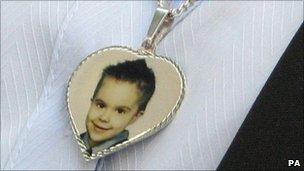E. coli outbreak butcher 'sold rotten meat for years'
- Published
A butcher at the centre of an E. coli outbreak in south Wales which killed a five-year-old boy sold rotten meat for years, a Newport inquest has heard.
Mason Jones, from Deri, near Bargoed, Rhymney Valley, died in 2005, and over 150 others, mostly children, fell ill.
The outbreak, which struck 44 schools, was the UK's second biggest.
The inquest heard the butcher was aware of the risks he was taking using the same equipment for cooked and uncooked meats. The inquest has been adjourned.
Det Supt Paul Burke said there was no doubt that the meat which was present at the factory had carried bacteria and the same bacteria had killed Mason.
Butcher William John Tudor, 58, of Cowbridge, was prosecuted for breaking food safety laws and was jailed for a year in 2007.
Mutton as lamb
But no further action was taken.
Mr Burke said investigations found clear evidence of the same type of E. coli bacteria that had killed Mason on samples of meat at the premises of John Tudor and Son in Bridgend.
He said expert evidence suggested that Tudor would have been fully aware of the risks of preparing cooked and uncooked meat using the same equipment.
The inquest heard how Tudor used to pass mutton off as lamb to customers.
Mr Burke said staff at the butchers had told him when they brought meat that was smelling or poor to Tudor's attention they were told to pass it off as faggots.

A picture of her son Mason Jones on a necklace worn by Sharon Mills
"When meat was turning yellow they were told to 'mince it up' and put it in the faggots," he told the hearing.
"The idea being that because faggots were spicy they would hide the taste of the meat."
Mr Burke said the firm would buy frozen New Zealand mutton and sell it as Welsh lamb.
False batch numbers linking it to a legitimate farm in south Wales were used to hide its origin.
He said that according to staff at the firm, hygiene rules had been disregarded for years.
Mr Burke said Tudor was well aware of safe hygiene practice because he had successfully sat a grade three hygiene diploma in 2002.
But some staff had never attended even basic hygiene courses, despite the need to do so.
The inquest heard the factory's only vacuum-packing machine was "not fit for purpose" and was used for both raw and cooked meats.
A "dirty old brush and container of water" was used to clean the machine between different users. Often it was not cleaned at all.
Cooked and raw meats were stored together and decomposing meat was discovered in a fridge at the factory.
'Not been in vain'
Meat seized was found to contain an identical E. coli O157 strain as the one that killed Mason.
The same strain was found at a Welsh farm where the meat originated and at an abattoir where Tudor bought the meat.
Sharon Mills, Mason's mother, wept as she gave evidence to the inquest.
She described how Mason's health had fluctuated over the course of about two weeks but he had to be taken into Bristol Children's Hospital where he died on 4 October 2005.
The inquest heard how Mason's parents were still concerned that improvements needed to be made in the enforcement of food safety laws and feared that some of the recommendations made by a public inquiry were still not being enforced.
Ms Mills said that they needed to be "enforced to stop this happening to another family, and if it prevents another death then I will know my son's death has not been in vain".
The inquest was adjourned.
Coroner David Bowen had said he would give his verdict on Wednesday.
- Published3 October 2010